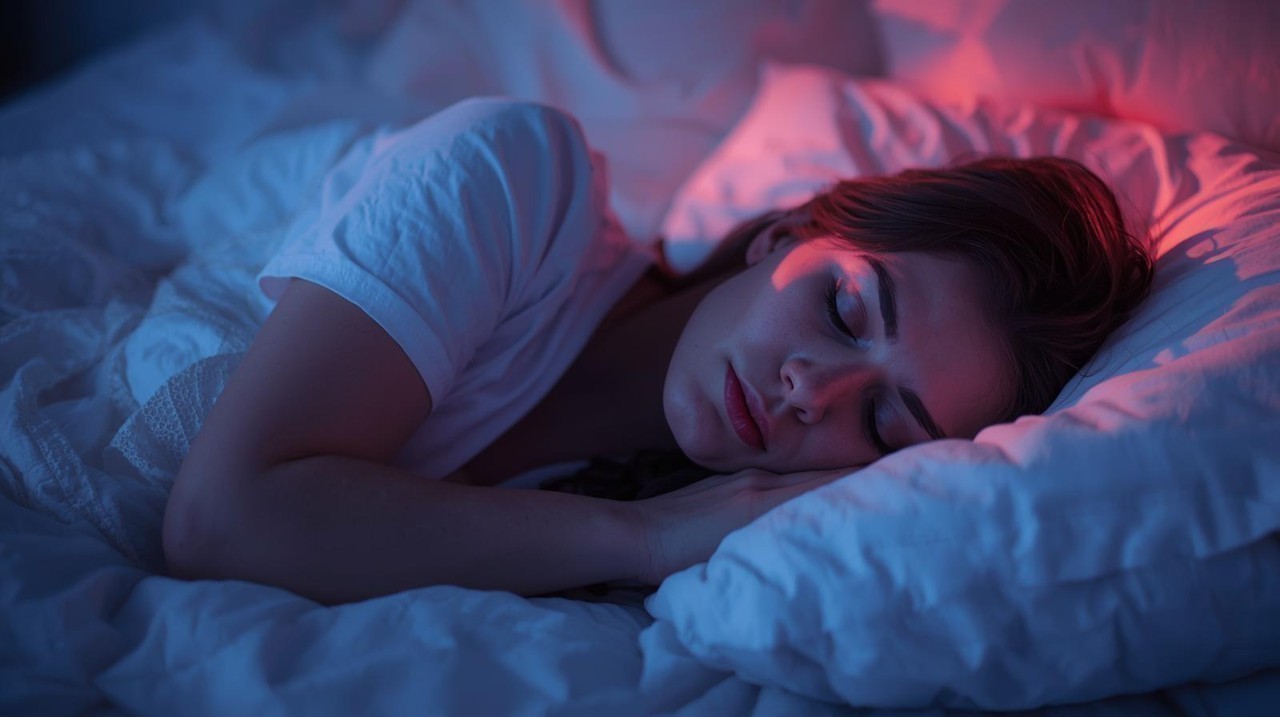
Post by : Sam Jeet Rahman
In today’s fast-paced world, getting a good night’s sleep can feel like a luxury. Between work stress, late-night screen time, and endless to-do lists, most people are sleep-deprived without even realizing it. Yet, sleep isn’t just about rest — it’s the body’s natural healing and repair mechanism.
When you understand the science of deep rest, you can make simple lifestyle changes that help you fall asleep faster, stay asleep longer, and wake up feeling truly refreshed. Let’s explore how to improve sleep naturally, backed by research and practical tips you can start using tonight.
Sleep is not just a passive state of rest — it’s an active biological process where your body and mind perform essential functions. During sleep, your brain clears out toxins, repairs tissues, consolidates memories, and balances hormones.
When you don’t get enough quality sleep, your cognitive function, mood, and physical health all take a hit. Chronic sleep deprivation is linked to:
Increased stress and anxiety
Weakened immune system
Higher risk of obesity, diabetes, and heart disease
Poor focus and decision-making
Accelerated aging and fatigue
Understanding these impacts is the first step toward making sleep a priority, not an afterthought.
Your body goes through several sleep cycles every night, each lasting about 90 minutes. These cycles consist of different stages:
Light Sleep (Stages 1 & 2) – This is when your body starts to relax and heart rate slows down.
Deep Sleep (Stage 3) – This is the most restorative stage where your body repairs tissues, builds muscles, and strengthens the immune system.
REM Sleep (Rapid Eye Movement) – The stage where dreaming occurs and memory consolidation takes place.
Deep sleep, also called slow-wave sleep, is crucial because it helps the body rejuvenate physically. Without it, even if you get eight hours of rest, you may still wake up tired and groggy.
Your surroundings can make or break your sleep quality. A cluttered, noisy, or brightly lit room signals your brain to stay alert. On the other hand, a calm and dark environment tells your body it’s time to rest.
Dim the lights an hour before bed to trigger melatonin production — your sleep hormone.
Keep your bedroom cool, ideally between 18–22°C (65–72°F).
Use blackout curtains or a sleep mask to block light.
Avoid screens at least 60 minutes before bed, as blue light interferes with melatonin release.
Invest in a comfortable mattress and pillows — they directly influence deep sleep quality.
A peaceful, technology-free space is your foundation for restorative sleep.
Your body follows a circadian rhythm, an internal clock that regulates sleep and wakefulness based on light exposure. When you sleep and wake at inconsistent times, your circadian rhythm becomes disrupted — leading to insomnia, fatigue, and brain fog.
Go to bed and wake up at the same time every day, even on weekends.
Get natural sunlight in the morning to signal wakefulness to your brain.
Avoid bright light at night — use warm or dim lighting instead.
This consistency helps your body recognize when it’s time to rest, improving your ability to enter deep sleep naturally.
What you consume during the day can greatly impact your sleep quality. Some foods and drinks energize you, while others help your body wind down.
Bananas, almonds, and walnuts – rich in magnesium and tryptophan.
Oats and yogurt – help release serotonin and melatonin.
Herbal teas like chamomile and valerian root – naturally calm the nervous system.
Caffeine (found in coffee, tea, energy drinks, and chocolate) — it can stay in your system for up to 8 hours.
Heavy or spicy meals, which can cause indigestion and restlessness.
Alcohol, which may make you sleepy initially but disrupts REM sleep later.
What you eat isn’t just about nutrition — it’s about how your body responds during rest.
Regular physical activity helps you fall asleep faster and enjoy deeper rest. Exercise reduces stress, boosts mood, and improves blood circulation, all of which contribute to better sleep.
However, the timing of your workout matters. Exercising too close to bedtime raises your body temperature and heart rate, making it harder to fall asleep.
Schedule workouts in the morning or early evening.
Include yoga, stretching, or light walks before bed for relaxation.
Avoid high-intensity workouts within 3 hours of bedtime.
Even 30 minutes of daily movement can improve sleep duration and quality.
An anxious mind is one of the biggest barriers to deep rest. When your brain is overactive — worrying, planning, or replaying the day’s events — your body can’t fully relax.
Practicing stress-reducing techniques before bed helps lower cortisol levels (the stress hormone) and prepare your body for sleep.
Try deep breathing: inhale for 4 seconds, hold for 7, exhale for 8.
Practice meditation or mindfulness journaling to release mental clutter.
Listen to calming music or nature sounds.
Read a physical book instead of scrolling on your phone.
Remember — peace of mind equals better rest.
A short power nap during the day can recharge you, but long or irregular naps can interfere with your nighttime sleep pattern. Similarly, stimulating activities before bed — like scrolling social media or watching TV — can keep your brain alert.
Limit naps to 20–30 minutes before 3 p.m.
Create a digital curfew — no phones or laptops an hour before bed.
Try a relaxing bedtime routine: gentle stretching, skincare, reading, or gratitude journaling.
This signals your brain that it’s time to transition from activity to rest.
Sleep hygiene refers to daily habits that promote consistent, quality sleep. It’s about setting up both your mind and environment for success.
Keep your room quiet, dark, and cool.
Stick to a consistent sleep schedule.
Avoid stimulants in the evening.
Practice relaxation rituals before bedtime.
Use your bed only for sleep and intimacy, not work or entertainment.
By improving your sleep hygiene, you train your body to associate bedtime with deep rest — not stress or stimulation.
Your brain thrives on structure. Having a consistent nighttime routine helps condition your mind for rest. Over time, the repetition becomes a cue for your body to relax.
9:00 PM – Turn off electronics.
9:10 PM – Brew a cup of herbal tea.
9:30 PM – Light stretching or reading.
10:00 PM – Meditation or deep breathing.
10:15 PM – Lights out.
Following a predictable sequence helps you fall asleep faster and stay asleep longer.
If you’ve tried all the natural strategies and still struggle with sleep, it may be time to consult a sleep specialist. Persistent insomnia, snoring, or restless sleep could be signs of underlying conditions like sleep apnea or anxiety disorders.
Professional guidance can help identify the root cause and suggest personalized solutions, such as cognitive behavioral therapy for insomnia (CBT-I), which has shown excellent long-term results.
Better sleep isn’t about perfection — it’s about understanding your body’s rhythm and making small, consistent changes that align with it.
By creating a sleep-friendly environment, managing stress and diet, and following a steady schedule, you can dramatically improve both the quality and depth of your sleep.
Remember — sleep isn’t a waste of time. It’s your body’s most powerful tool for recovery, balance, and growth. Start tonight, and you’ll wake up tomorrow feeling more focused, calm, and energized than ever before.

IKEA India Leases 37K Sq Ft in Pune Mall for City Store
IKEA India secures 37,259 sq ft at Phoenix Marketcity, Pune, marking a key step in its city-store ex

UAE-Oman Rail Freight Service Set to Boost Regional Trade
Noatum Logistics and Hafeet Rail partner to start UAE-Oman rail freight, enhancing trade, supply cha

Kosovo President Meets Saudi Minister to Strengthen Ties
Kosovo President Vjosa Osmani met Saudi Minister Faisal Alibrahim to strengthen economic ties and ex

TV Star Paridhi Sharma Enters Films with Controversial Haq
Paridhi Sharma marks her film debut with Haq inspired by the Shah Bano case while facing legal hurdl

ChatGPT Voice Mode Set for Major Upgrades This Month
ChatGPT voice mode gets real-time transcripts, mute/unmute options, rich content, and direct messagi

Doncic Scores 49 as Lakers Beat Timberwolves 128-110
Luka Doncic scores 49 points, Lakers shoot 59% to beat Timberwolves 128-110; Austin Reaves, Rui Hach

iOS 26 Adaptive Power iPhones Get Longer Battery Life
iOS 26 brings Adaptive Power to iPhones, extending battery life intelligently without affecting perf

Doncic Scores 49 as Lakers Beat Timberwolves 128-110
Luka Doncic scores 49 points, Lakers shoot 59% to beat Timberwolves 128-110; Austin Reaves, Rui Hach

Sacramento Kings Beat Utah Jazz 105-104 with Late Sabonis Shot
Domantas Sabonis scores game-winner as Kings beat Jazz 105-104 in home opener, Zach LaVine and Malik

Messi’s Argentina Match in India Postponed, New Date Soon
Argentina’s friendly against India in Kochi is postponed due to FIFA approval delays; organizers wil

Rohit and Kohli End ODI Careers in Australia with Win
Rohit Sharma and Virat Kohli bid farewell to Australian ODIs after a final win, forming a 168-run un

George Russell Sneaks into Mexican GP Stands in Wrestling Mask
George Russell wore a Mexican wrestling mask to watch practice from the stands during the Mexican Gr

Dutch Cyclists Van de Wouw and Wiebes Win Second World Titles
Dutch riders Hetty van de Wouw and Lorena Wiebes win second world titles at UCI Track Cycling Champi

Williamson Returns to New Zealand Squad for ODI Series
Former captain Kane Williamson returns for ODIs against England, balancing family, pro leagues, and

Services Bowlers Make History With Two Hat-Tricks in Assam
Services bowlers Arjun Sharma and Mohit Jangra achieved two hat-tricks in Assam’s Ranji Trophy match